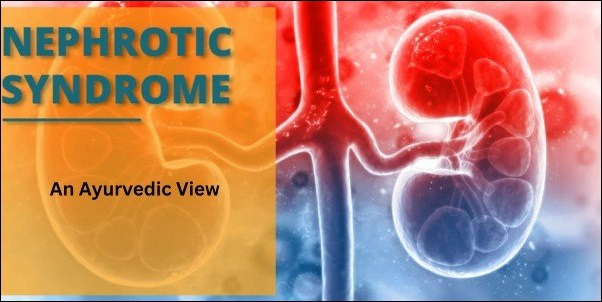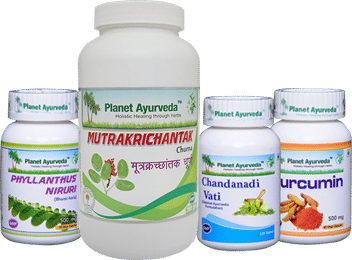Chronic Kidney Disease (CKD) Causes Symptoms & Ayurvedic Management
Abstract
Chronic Kidney Disease (CKD), also known as Chronic Kidney Failure. It is a condition where kidney function deteriorates gradually over time. The kidneys play a crucial role in filtering waste and extra fluid from the blood, which are then excreted through urine. As CKD progresses to a more advanced stage. It leads to harmful accumulation of fluids, electrolytes, and waste products in the body. In the initial stage of chronic kidney disease, there may be little to no noticeable symptoms. Sometimes symptoms don’t show up until it reaches an advanced stage. The treatment for Chronic Kidney Disease aims to slow the progression of kidney damage. In this article, we will discuss its Ayurvedic Aspect and its management.

Introduction
Chronic Kidney Disease (CKD) is defined by the presence of kidney damage or a reduced estimated glomerular filtration rate (eGFR) of less than 60 mL/min/1.72 m² that lasts for 3 months or longer, regardless of the underlying cause. CKD involves a gradual decline in kidney function, eventually leading to the need for renal replacement treatment like dialysis or a kidney transplant. Kidney damage is indicated by abnormalities seen in imaging tests or kidney biopsies, changes in urinary sediment, or elevated levels of the albumin in the urine.
Stages of Chronic Kidney Disease
Chronic Kidney Disease (CKD) is categorized into five stages based on the severity of kidney damage and how well the kidneys are functioning, measured by the glomerular filtration rate (GFR).
Stage 1: Kidney Damage with Normal or High Function (GFR ≥ 90)
- GFR: 90 or more
- Kidney Function: Normal or only slightly impaired
- Symptoms: Typically no noticeable symptoms, but kidney damage may be detected through tests (e.g., protein in urine or structural changes).
Stage 2: Mild Kidney Damage with Slightly Reduced Function (GFR 60–89)
- GFR: 60–89
- Kidney Function: Mild decline in kidney function
- Symptoms: Few to no symptoms, but abnormalities may appear in lab results (e.g., urine tests).
Stage 3: Moderate Kidney Damage (GFR 30–59)
- GFR: 30–59
- Kidney Function: Moderate decrease in kidney function
- Symptoms: Possible fatigue, swelling, and changes in urination.
Stage 4: Severe Kidney Damage (GFR 15–29)
- GFR: 15–29
- Kidney Function: Significant loss of kidney function
- Symptoms: More noticeable symptoms such as fatigue, swelling, loss of appetite, and nausea.
Stage 5: End-Stage Kidney Failure (GFR < 15)
- GFR: Below 15
- Kidney Function: Minimal to no kidney function
- Symptoms: Severe symptoms like extreme fatigue, swelling, shortness of breath, and life-threatening complications.
GFR Ranges:
- Stage 1: GFR ≥ 90
- Stage 2: GFR 60–89
- Stage 3: GFR 30–59
- Stage 4: GFR 15–29
- Stage 5: GFR < 15
Causes
Chronic Kidney disease can result from a variety of causes, many of which are related to underlying health conditions or lifestyle factors. Here are some of the most common causes of CKD :
- Type 1 and Type 2 Diabetes
- Hypertension
- Family History
- Glomerulonephritis
- Autoimmune diseases like Lupus and Vasculitis
- Polycystic kidney Disease (PKD)
- Prolonged use of certain medications
- Pyelonephritis
- Obstruction inthe urinary tract
- Heart disease
- Smoking
- Obesity
- Dehydration
Symptoms
Symptoms of chronic kidney disease (CKD) can be subtle or absent in the early stage, and noticeable only when the condition worsens.
Early Stages (1-3) – Few or No Symptoms:
- Generally no noticeable symptoms in the initial stages
- Tiredness or Weakness
- Increased Urination
Stage 3 (Moderate Kidney Damage) – Symptoms Start to Appear:
- Swelling
- Altered Urine Patterns
- Pain in the Lower Back or Sides
- Breathing Difficulty
Stage 4 (Severe Kidney Damage) – More Severe Symptoms:
- Nausea and Vomiting
- Loss of Appetite
- Metallic Taste
- Muscle Cramps
- Extreme Fatigue
Stage 5 (Kidney Failure) – Severe, Life-Impacting Symptoms:
- Severe Swelling
- Cognitive Issues
- Itching
- Chest Pain
- Intense Shortness of Breath
- Reduced Urine Production
Other Symptoms in Later Stages
- High Blood Pressure
- Paleness
- Bad-Smelling Breath
Diagnosis
Diagnosis of Chronic Kidney Disease (CKD) typically involves various tests to assess kidney function and identify potential causes.
1. Blood Tests:
- Creatinine test
- Blood urea Nitrogen (BUN)
- Estimated Glomerular Filtration rate (eGFR)
2. Urine Tests:
- Urinalysis
- Albumin-to-Creatinine Ratio (UACR)
3. Imaging tests:
- Ultrasound
- CT scan or MRI
Kidney Biopsy
Additional Tests:
- Electrolyte test
CKD staging based on diagnosis
- Stage 1: GFR ≥ 90, with evidence of kidney damage (proteinuria, abnormal imaging, etc.)
- Stage 2: GFR between 60 and 89, with kidney damage
- Stage 3: GFR between 30 and 59
- Stage 4: GFR between 15 and 29
- Stage 5: GFR < 15, indicating kidney failure
Complications
Chronic Kidney Disease (CKD) can lead to several Serious complications as the disease progresses. These complications occur due to the kidney’s reduced ability to filter waste and maintain the balance of fluid and electrolytes. Some complications are directly related to kidney failure, while others stem from the impact of CKD on other organs and systems in the body.
- Hypertension
- Salt/fluid balance
- Metabolic acidosis
- Hyperphosphatemia
- Hyperkalemia
- Cardiovascular disease
- Anemia
- Gout
Treatment
The treatment of Chronic kidney disease (CKD) includes:
1. Lifestyle Changes:
- Low sodium diet
- Protein control
- Phosphorus and potassium management
- Fluid control
- Physical activities
- Manage weight
- Quit smoking
- Limit alcohol intake
2. Medications:
- Angiotensin-converting Enzyme (ACE) inhibitors or Angiotensin 2 receptor blocker (ARBs)
- Diuretics
- Erythropoiesis-Stimulating Agents (ESAs)
- Phosphate Binders
- Potassium Binders
- Vitamin D Supplements
3. Dialysis
- Hemodialysis
- Peritoneal dialysis
4. Kidney Transplant
Ayurvedic Overview
In Ayurveda, Vrikka Vikara refers to disease affecting the Mutravaha Srotas (Urinary system) and it aligns closely with the concept of Chronic Kidney Disease (CKD). This condition is seen as a result of disturbance in various Srotas (Chennels) such as Rasavaha, Raktavaha, Mamsavaha and Medovaha. Which leads to Mutravaha Srotas dysfunction, including the depletion of Oja (Vital energy).
Purvarupa (Prodromal Symptoms)
- Agnimandya (Loss of Digestive fire)
- Nindranasha (Sleeplessness)
- Netrasotha (Puffiness in eyes)
- Nadistabdha (Stiffness or obstruction in the channels)
- Vega mukta (frequent micturation)
- Ushmata (Sensation of warmth or elevated body temperature)
- Roukshyam (Dryness of the skin or Tissues)
Rupa (Signs and Symptoms)
- Swelling or inflammation
- pain
- Vomiting
- Pale and yellow discolouration of face due to loss of blood
- Absence of sweat on the face
- Pain in the lower back, the Abdomen, and the kidney region
- Retention of urine
- Painful Micturition
- Urine, mixed with blood
- Fever
- Headache
- Dryness of skin
- Poor digestive fire
- Kidney stones
- Coldness in hands and feet
- Affliction of the heart and spleen due to kidney disorder
- Fainting
Treatment
Ayurvedic treatment can help in managing the symptoms and slow down the progression of CKD. it includes :
Herbs:
- Gokshura
- Punarnava
- Trin panchmool
- Varun
- Chandan
- Lajwanti
- Pippali
- Dadim
- Bhumi Amla
- Kalmegh
- Palaash
Herbal Formulation:
- Chandrakala Ras
- Shwet Parpati
- Chandraprabha Vati
- Gokshuradi Guggul
- Hingvadi vati
- Yavakshar Kantkari churna
- Trinpanchmuladi Kwath
- Punarnava Asav
- Shatavari ghrita
Herbal Remedies for Chronic Kidney Disease by Planet Ayurveda
Planet Ayurveda is a GMP certified, well-known Ayurvedic company. It focuses on providing herbal supplements and treatments for various health conditions based on the principles of traditional Ayurveda. All their formulations are 100% pure, herbal, chemical free and safe to use. These formulations are prepared under the supervision of MD (Ayurveda) scholars. Planet Ayurveda provides a wide range of natural remedies, using high quality herbs that are sourced and processed with strict quality control measures. They have many effective herbal formulations for chronic diseases, one of them is the Revive kidney care pack
Revive Kidney Pack For Advanced Stage
Product Description:
1. Mutrakrichantak Churna
This herbal powder is a natural blend of Varun (Crataeva Nurvala), Bhumi Amla (Phyllanthus Niruri), Gokshur (Tribulus Terrestris), Kalmegh (Andrographis paniculata). This powder is formulated to help with a wide range of kidney-related issues. All these herbs used in this powder help to support the kidney, reduce Swelling and Edema, and improve urinary function. It has a property of anti-inflammation. So, it is beneficial in conditions like Chronic liver disease.
Dosage: 1 tsp two times a day with warm water after a meal
2. Rencure Formula
This capsule is pure extract of Punarnava (Boerhavia Diffusa), Varun (Crataeva Nurvala), Gokshur (Tribulus Terrestris), Palaash (Butea Monosperma), Kasni (Cichorium Intybus). This formulation helps to detoxify the kidney, reduce inflammation, and helps to prevent kidney stones. This capsule promotes overall renal health.
Dosage: 1 Capsule two times a day with warm water after a meal
3. Gokshuradi Guggul
These capsules are standardised pure extract of Gokshura (Tribulus Terresreis), Guggul (Commiphore mukul), Black Pepper (Piper Nigrum), Ginger (Zingiber Officinale), Pippali (Piper Longum), Amla (Emblica Officinalis) etc. These ingredients work together to rejuvenate kidney health and contribute to its maintenance. Kidney infections, which are becoming more common, can significantly worsen kidney function. However, this formulation helps reduce the buildup of endotoxins within the kidneys and lowers the risk of swelling. Additionally, as a herbal supplement, it is free from harmful side effects.
Dosage: 2 tablets three times a day with warm water after a meal
4. Punarnava Capsule
This capsule is a standardised pure extract of Punarnava (Boerhavia Diffusa). Punarnava has shown potential benefits due to its diuretic, anti-inflammatory, and antioxidant properties. It is commonly used to support kidney function and manage various kidney-related conditions.
Dosage: 2 capsules two times a day with warm water after a meal
5. Phyllanthus Niruri
This capsule is a standardised pure extract of Bhumi Amla ( Phyllanthus Niruri). Bhumi Amla is known for its diuretic, detoxifying, and anti-inflammatory properties, which make it especially useful in the management of CKD.
Dosage: 1 Capsule two times a day with warm water after a meal
6. Saral Ghan Vati
This tablet is a standardised pure extract of saral (Pinus Roxburghii). It helps to improve kidney functions, acts as a diuretic, helps to reduce inflammation, and detoxifies the body. It also helps to maintain fluid balance in the body, hence it is very useful in such conditions.
Dosage: 2 tablets three times a day with warm water after a meal
7. Nephralka Capsule
This capsule is a pure extract of Bhumi Amla (Phyllanthus Niruri), Mooli satva (Raphanus Sativus), Revandchini (Rheum Emodi), Kalmegh (Andrographis paniculata), punarnava (Boerhavia Diffusa) Nephralka Capsule is an Ayurvedic formulation designed to support kidney health and manage conditions related to kidney dysfunction, such as Chronic Kidney Disease (CKD), kidney stones, and urinary tract infections (UTIs). It is made from a combination of natural herbs that are known for their nephroprotective, anti-inflammatory, diuretic, and antioxidant properties, making it beneficial for overall kidney function.
Dosage: 1 Capsule two times a day with warm water after a meal
8. Chandansav
This herbal formulation is in Liquid form. It is a pure extract of Safed Chandan (Santalum Album), Tagar (Valeriana Wallichii), Khus (Vetiveria Zizanioides), Nagarmotha (Cyperus Rotundus), Gambhari (Gmelina Arborea), Nelophar (Nymphaea Stellata) etc. It helps to provide a cooling effect on the body and improves urinary health. It helps to reduce inflammation as it has anti-inflammatory and detoxifying properties.
Dosage: 2 tsp two times a day with an equal amount of warm water after a meal
Conclusion
In conclusion, Ayurveda can support the management of Chronic Kidney Disease (CKD) through herbs, dietary changes, lifestyle management, and Planet Ayurveda’s Revive kidney pack for Advanced stage. This helps improve kidney function and reduce inflammation. Revive kidney care for the advanced stage is a pack designed to support kidney health.





